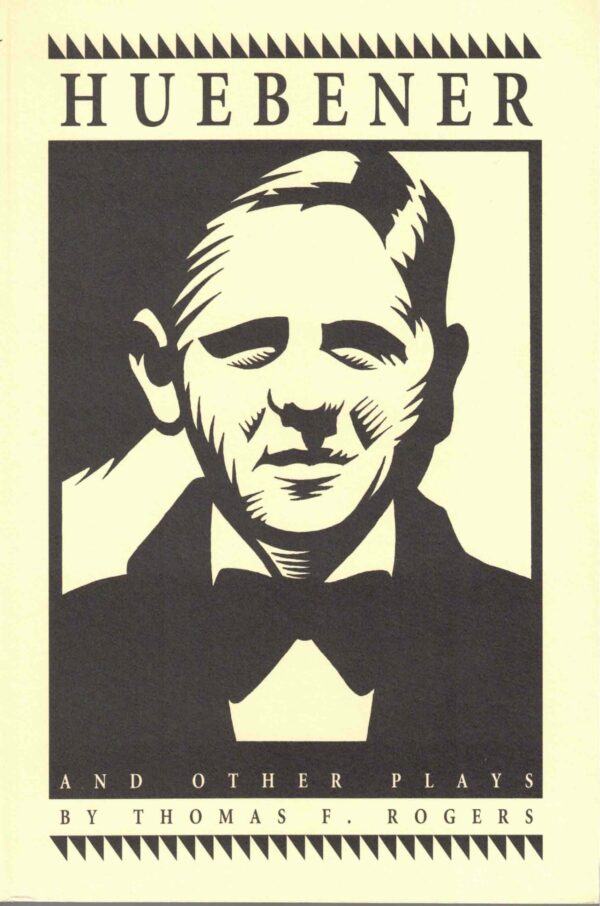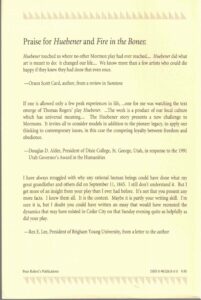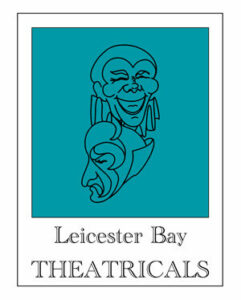FIVE PLAYS:
- Huebener — During World War II, while aware of the risk to his life, the fearless young German Latter-day Saint Helmuth Huebener persisted in launching a campaign against Hitler’s propaganda machine. In this play we witness the tragic story of Mormonism’s arguably greatest twentieth-century martyr.
- Fire In The Bones — This first ever literary treatment of the Mountain Meadows Massacre brings to light the complex and tragic circumstances that underlie the catastrophe that in 1857 cast a shadow on the Latter-day Saints. Even today some church members fear to know the particulars, while agenda driven detractors only add to the general suspicion. Faithful to Juanita Brooks’ thorough and accurate scholarship, FIRE IN THE BONES completely exonerates Brigham Young as the massacre’s instigator, while still suggesting the tragic dilemma into which well-meaning persons, like John D. Lee, are sometimes thrust and the sacrifices that a community, right or wrong, may require of them.The play is a study in tainted conscience and mob psychology, of people’s paranoia in the wake of an anticipated extermination, as during the Utah War. In their temperament and their fate, its characters resemble the zealots of every society and every age. Such people–ancient or modern–make tragedy as timely as ever. With grateful acknowledgement to Juanita Brooks, whose valiant life’s work called the subject of John D. Lee to our attention and provided the impeccable research that underlies almost every line of the script.
- Gentle Barbarian — Based on the life of Russian author, Ivan Turgenev, this taut play is very Chekhovian in nature. Its characters are richly drawn and full of repressed sensuality. Their lives and loves interweave, creating a tapestry of Russia during the middle 1800’s — the Russia of the Tsar — the Russia of both the privileged few and the peasant working class. (sounds like America of the early 2000s) It is fascinating to notice that–despite the social upheaval that led to its eventual dissolution and once more the former USSR — much remains as before. In its poignant irony, Turgenev’s own personal story surpasses those he penned which, in Western Europe, won for him such acclaim. In the person of this humanitarian idealist, the play illustrates the hypocrisy and self-deception of many a well-intended intellectual. Contains adult situations and language.
- Frére Lawrence — The late private life of T. E. Lawrence derives from Lawrence’s posthumously published autobiography, The Mint. A military hero of mythic proportions after WW I and dutifully subject to his society’s stringent Victorian mores — so antithetical to his true nature — he later adopts the surname Shaw and chooses anonymity as a non-commissioned serviceman, thus totally expunging his former identity, a kind of suicide. The noble, neurotic Lawrence evokes our nearly insatiable and often frustrated yearning for intimacy, or as Freud titled it, the “discontent” of “civilization” — the perhaps most fundamental socio-biological root of everyone’s ‘double bind,’ for which talent and prominence are ultimately no sublimation and often the catalytic source of a deep seated loneliness. Both with a mix of present tense and flashback (derived from Lawrence’s classic memoir, The Seven Pillars of Wisdom, and through the eyes of so-called intimates, the story unfolds as a nightmare of images and aural effects that weave the fabric of the “genius” known as “Lawrence of Arabia.” Contains adult language and situations.
- Charades — A one-time stock broker, the middle-aged Danny, boasts about his mercenary adventures in Rhodesia, Nicaragua and more recently Afghanistan. He also claims to have an adopted son there, a defector from the Red Army. In Danny’s absence a younger man shows up, claiming to be a Soviet Defector and Danny’s actual son. We later learn that he is bent on killing Danny for ostensibly betraying his mother to the KGB. Meanwhile, Danny’s one certain offspring, the pregnant Gladys, accuses her father of sending her husband to Afghanistan. To absolve himself, Danny must admit his military exploits are an illusion. In doing so, however, he will betray the possibility that Gladys never had a husband. He leaves the choice to her. The other characters’ histories equally come into question: whether Danny’s father was ever insane; whether his father’s dog is still alive; whether Danny’s aunt once had an affair with a Spaniard named Jesus; and whether the young Russian is really Danny’s son. Each must wrestle with the prospect that the authenticity of our dreams is less important than how they affect our relationship with others. This play contains adult language and situations.
BOOK DETAILS:
- Publisher: Poor Robert’s Publications
- ISBN: 0-9632618-0-0
- 238 pages
- Paperback
- Order #HUEBENER1992
PURCHASE:
The PAPERBACK Order #Huebener1992 is available for $18.00. (includes the Maine State Tax and shipping) The book is in mint new condition. A great way to peruse these FIVE plays by Thomas F. Rogers.
From the Catalog of



